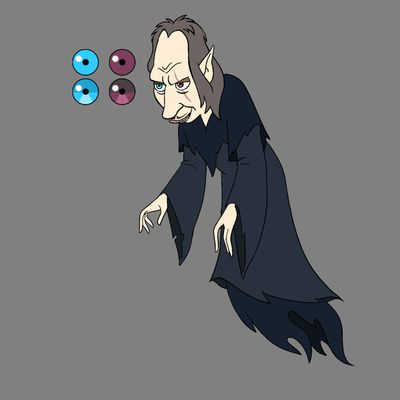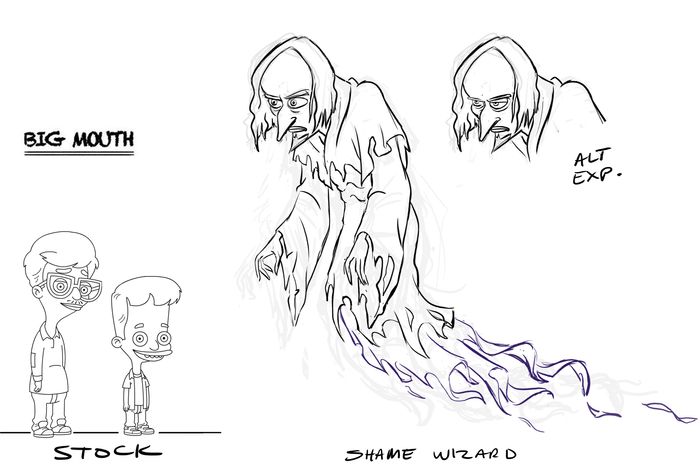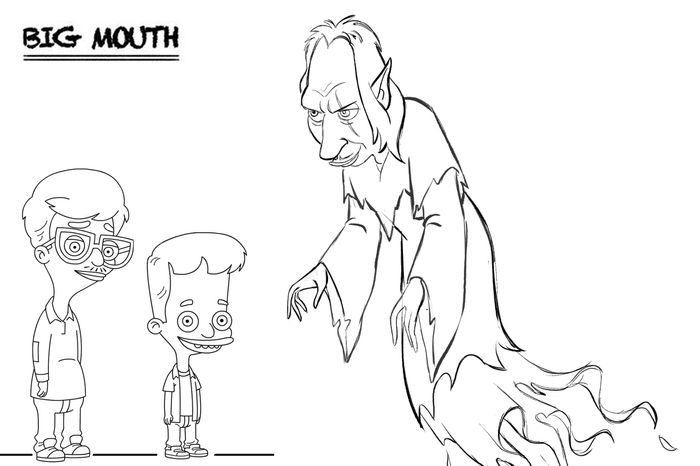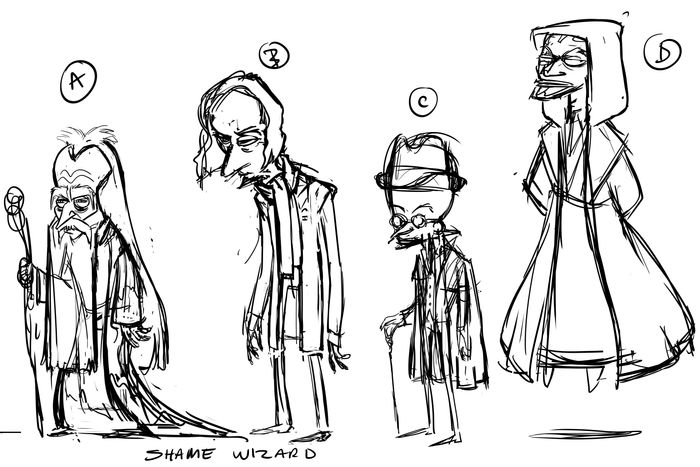
As much as Netflix’s coming-of-age animated comedy Big Mouth is filled with clever jokes about sex and puberty, it’s also about the darker, most embarrassing aspects of growing up. Nowhere is that more apparent than with season two’s introduction of the Shame Wizard, a devious British ghoul who inflicts self-doubt and self-hatred upon the teenage heroes.
Voiced by David Thewlis at his spookiest, the Shame Wizard creeps into the minds of Nick (Nick Kroll), Andrew (John Mulaney), Jessi (Jessi Klein), Missy (Jenny Slate), and all the other kids, convincing them that their secret hormonal desires are dark and wrong, a notion Big Mouth itself tries to combat by way of songs about boobs. “Our culture is uncomfortable talking to teenagers about sexuality, so we try to avoid it,” co-creator Andrew Goldberg told Vulture about their inspiration for the Shame Wizard. “I think an unintended consequence of that is they feel shameful about it. They assume that if it’s secretive and we’re quiet about it, there’s something wrong with it.”
The Shame Wizard’s origin story is pretty simple: After the show’s first season played with the idea of hormonal chaos embodied by various Hormone Monsters (voiced by Kroll and Maya Rudolph), Goldberg thought they should explore the other side of that experience. “I wrote on our whiteboard, the Hormone Monster needs a mortal enemy,” Goldberg recalled. A few days later, he suggested that enemy be a “shame monster,” which co-creator Nick Kroll modified from monster to wizard. “He was like, ‘No, shame is not a monster, shame is a wizard,’” Goldberg said. “Because shame is clever and tricky and needles its way into you.”
As it happened, many of the show’s writers were watching the third season of FX’s Fargo, where David Thewlis plays a conniving villain, and they latched onto his performance as the embodiment of the character they were writing. “He’s a villain, but he’s charming at times, and repulsive at times, and shame is the smartest person in the room,” Goldberg said. “That’s how we got the idea of asking David to do it, and fortunately he said yes.”
The writing staff nicknamed Thewlis “the charm wizard,” given how easy he was to work with. “Once we had him and his voice, it became a nice cycle where he inspired different ideas for different character,” Goldberg said. That includes the look of the Shame Wizard himself, who appears as a spectral being akin to the Dementors in Harry Potter — and whose introduction comes in a scene where he puts Andrew on trial, recalling the wizarding world’s Ministry of Magic. “We were like, David has such an interesting face maybe [the Shame Wizard] should look more like him,” Goldberg said, so much so that the first time they showed Thewlis a sketch of the character, “He was like, ‘Is that me?’”


Separate from the Shame Wizard’s look was figuring out how the character would actually behave. There, the show’s writers started digging into the mechanics of shame, relying in a large part of the research of Brené Brown, who has done research on the concept of vulnerability and given a TED Talk on the subject. Key to developing the concept of the Shame Wizard, in the writers’ minds, was the distinction between shame and guilt. “Guilt is, I made a mistake, shame is, I am a mistake. Guilt is, I did a bad thing, shame is, I am a bad thing,” Goldberg said. And so, the Shame Wizard would manipulate each character by finding their specific anxieties — Andrew’s shame about masturbating, Jessi’s shame over her parents’ divorce — and making them feel responsible. The characters get isolated and lash out at each other in response, not realizing until late into the season that the same creature is tormenting all of them. “This was also kind of inspired by Brené Brown,” Goldberg said. “We all have different reasons for feeling shame, but seem to manifest it in very similar ways.”
The Shame Wizard wasn’t originally going to be such a major presence, but as Goldberg, Kroll, and co-creators Jennifer Flackett and Mark Levin looked at the idea further, they decided to make him the core of the season. As the Shame Wizard weasels into the kids’ heads one by one, he gets increasingly powerful, a moment which crescendos with his big, villainous song. That number, written by Mark Rivers — who also wrote season one’s Emmy-nominated “Totally Gay” — starts as a sort of Disney Villain song, before turning into a Beatles-like British Invasion–style rock tune. “We asked David, ‘Would you be open to singing?’” Goldberg said. “He said he fronted a band back in his youth, and you’re like, All right, let’s do it.”
The ultimate catharsis comes in a sequence where the kids realize they can all see the Shame Wizard, and then banish him after a game of “Smooch or Share” proves that what they find shameful isn’t too scary or embarrassing. Freed from the Shame Wizard’s clutches, they launch into a chaotic existence without any shame at all, and it’s both sweet and a little terrifying to see these middle-schoolers act with zero restraint: Characters wander around without pants, hump inanimate objects in public, and even poop through a basketball hoop. Big Mouth’s writers did a lot of guessing what they’d do without shame, and came up with so much material they had to cut a lot of it down. “There was a time when a world without shame was like half of that episode,” Goldberg said.
They do eventually wind back the debauchery a bit, and even learn to live with the Shame Wizard, who’s revealed to be a pathetic guy himself. “What makes shame so powerful is that it’s so internal, and you keep it secret, and you don’t talk about it and it just festers, and you judge yourself,” Goldberg said. “That kind of empathy and vulnerability is the way to combat it.” That ideas is the ethos of Big Mouth — as long as it comes with dick jokes.



